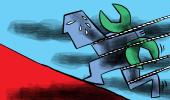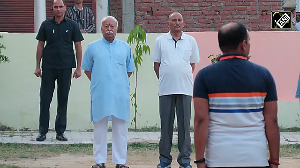'You think: Did I fail the people I had to let go? Did I promise something I couldn't deliver? That day, when we had to sack 70 people, will stay with me.'

When startups falter, headlines often focus on failure. Sometimes, however, such experiences quietly redefine what leadership truly means.
Harsh Pokharna, co-founder and CEO of OkCredit, faced one of the most difficult decisions a founder can be required to make -- laying off 70 employees after a product didn't work.
What followed, though, was not carnage.
Instead, in a rare act of empathy, accountability and deep human connection, Harsh and OKCredit's co-founders, Gaurav Kumar and Aditya Prasad personally helped 67 of the laid-off employees find new jobs before their three-month notice period ended.
An alumnus of IIT-Kanpur, Harsh began his career at Flipkart before taking the entrepreneurial leap in 2017 to build OkCredit, a digital bookkeeping platform for small businesses.
He doesn't come from generational wealth and speaks candidly about what it means to build a business from the ground up with limited resources and relentless ambition.
Talking to Prasanna D Zore/Rediff, Harsh opens up about resilience and the kind of integrity may not make headlines but definitely shapes lives.
What Harsh and his co-founders did was not just a logistical effort -- it was a courageous, compassionate response to a moment of crisis. A powerful reminder that real leadership is measured not when things go right but in how you react when everything goes wrong.
Harsh, this is a rare story -- an employer lays off 70 people and then helps 67 of them find new jobs. Can you walk us through what led to this tough decision at OkCredit?
Yes. This has a back story. It happened 18 months ago. At that time, we had taken aggressive bets on certain products.
OkCredit then provided a bookkeeping solution to small businesses. That was our core. But we wanted to go beyond that -- we wanted to digitise all the operations of a small business. So we built products like OkShop, OkStaff, OkPay, OkSales.
Some of them worked, but many didn't really see the adoption we hoped for. Small businesses weren't willing to pay for them so they weren't sustainable.
Once that became clear, we had to make the difficult call to let go of those teams. We didn't want to, obviously; it was heartbreaking. But continuing would have meant stretching ourselves too thin, risking the company as a whole.
What was going through your mind emotionally? You wrote on LinkedIn about how hard it was.
Emotionally, it was very hard. We were very connected with these employees. You work with them day in and day out -- they become like family. That's how it is in startups, right? It's not just a phrase when we call it the 'OkCredit family'.
I was in two minds.
We thought that if these products aren't working, can we use the same team to try something else?
At the same time, we knew we needed to double down on what was working.
There was also this deep sense of disappointment... we had given people this vision that all these products would work. And they didn't.
Somewhere, I felt I didn't choose well; I didn't make the right calls. So all of that was going on -- guilt, second-guessing, that feeling of having let people down.
What leadership lessons did you take away from this experience?
Many, many, lessons.
First of all, going forward, I want to plan hiring much better.
We had very aggressive projections and we hired a lot of people based on those projections. Maybe now I would test a product with a small team first, see if it really works, and then scale it.
But more than that, I realised that leadership is empathy. It's about helping your people. Because they're not objects you can just use and discard. They are people.
Also, I learned that economics and emotion... they do churn together. It's not clean-cut.
Another thing that I realised only later -- when I finally posted about this online and the way people reacted -- is that what happened spoke so much about our company's culture. People saw who we were. That meant a lot.
Why did you wait so long -- 16 months -- to speak about it publicly?
I was thinking about that too. One reason is we work with a lot of lenders. And when something like this comes out, there's a risk -- people think it's a sinking ship. That it's not doing well. That fear was there.
We didn't want lenders or investors to hear about it from somewhere else -- we wanted to control the story. So I waited. But once we made the turnaround, I felt more confident. I had the courage then to talk about it.
Was your support for the laid-off employees limited to helping them find jobs or did it go beyond that?
It was very hands-on. Our HR team made it their top priority. We weren't hiring at the time so all their effort was focused on helping these folks.
They helped with resumes, job referrals... My co-founders and I and other senior folk in our company reached out to our contacts in the ecosystem.
We asked: Who's hiring, what roles are open? We didn't stop till we got responses. We made referrals, gave recommendations, prepped for interviews.
Whatever was needed, we did.
Were the jobs they landed comparable in terms of salary and roles?
Mostly yes.
They got roles similar to what they had here in terms of seniority and compensation. That was something we made sure of -- it wasn't about just placing them anywhere, it was about making sure they got what they deserved.
What does this say about the maturity of the Indian startup ecosystem today?
I think it's getting much more mature day by day.
Honestly, I wouldn't have imagined this four or five years ago. But now, so many startups are coming up, so much innovation is happening. Everyone needs good people, especially those with a startup mindset.
So when we reached out, companies were happy to interview our people. They knew OkCredit had a good culture; that our team was used to the pace and thrill and churn associated with startups. That made a difference.
Can you describe the day you broke the news to the team? How did people react?
That was one of the hardest days of my life.
We called everyone and told them and, for many, it came as a total shock. One of the girls, I remember, started crying on the phone. She said how much she loved working at OkCredit and asked, "What am I going to do now?"
Others were heartbroken too. Very emotional. And we felt that guilt again -- like, what have we done?
As entrepreneurs, you carry this weight. You think: Did I fail these people? Did I promise something I couldn't deliver? That day, when we had to sack 70 people, will stay with me.

You started OkCredit after quitting a stable job at Flipkart. What broader challenges do you see for middle-class entrepreneurs today?
It's very hard, honestly. Unless you come from money, it's difficult to start something.
If you're middle class, you have to earn. You have to send money home, pay off loans, survive. And if you're doing a job on the side, investors won't take you seriously. They'll say you're not 'all in.'
So you're in a dilemma -- how can you go all in when you can't afford to quit your job?
I think it needs to be normalised -- people doing side hustles, freelance gigs, something to support themselves while they build (startups). Because otherwise, they'll only give it three months and if it doesn't work, they'll quit.
And three months is not enough to build a startup. You need to give it years.
In the light of today's global volatility, how can startups balance aggressive growth with sustainability?
From my own experience, I would still be aggressive about a product that's working. Startups are all about growth, market share, becoming big.
But I think the mistake we made was assuming a product would work before testing it. Knowing this now, I would first test with a small team. If it works, then I'd scale it.
That's the only thing I would change. Don't bet the whole team on an unproven idea.
You've seen the ecosystem evolve since 2017. What's your take on the opportunities and challenges today?
I've already talked about the challenges. As for opportunities, the potential is limitless potential.
Every sector is getting digitised. With AI coming in, there's going to be another wave of disruption. Especially in SaaS -- wherever SaaS has been built, AI-first SaaS will now come.
I think the biggest opportunity I see is that every sector will have a second innings, thanks to AI.
What advice would you offer to aspiring entrepreneurs in India today?
My advice would be: Don't think of startups as a get-rich-quick scheme. It's not that. It takes years of patience, of effort, of failing and getting back up.
Also, no matter what people say -- 'go all in,' 'burn the bridges' -- my advice would be: If you can have a side gig, do it. Freelance, consult, earn a little. And use the rest of your time to build.
That's what will help you sustain your idea for the long run. That's what gives you a real shot.












 © 2025
© 2025